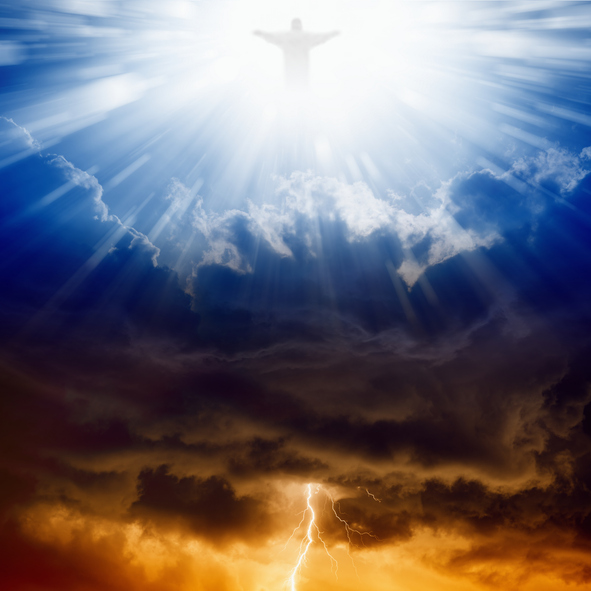Where do we go when we die?
The Bible teaches us about this subject. Christ, the Apostles, and the prophets explain that when a person dies, they are asleep in a state of inactivity until the time of their resurrection.

We will all go before the judgment seat of Christ.
Some clergy explain that when someone dies, good people go to heaven and bad people go to “hell”, being tortured by demons for all eternity. This teaching has been passed on as an accepted belief for centuries and there are Bible verses that make it sound like this could happen, but it’s actually an analogy. Some clergy say the deceased are now “looking down from heaven, watching over you”. Have you ever been to a funeral where the clergyman says, “This man didn’t quite live up to the standard and is now screaming at us from below, being tortured by a fiery landscape of brimstone and dwelling among devils?” Probably not. To condemn an individual this way would be to judge them, and the Bible says it’s not time for judgment” (Ecclesiastes 3:17, 12:14). If they declare a person is in heaven, is that not also making a judgment on them? It is not time for us to judge. Also, reason this: the Bible teaches that we either live forever or die forever (Deuteronomy 30:19). If a person was being tortured for all eternity, wouldn’t he or she still be alive? When a person dies, they are asleep in the grave until their time of resurrection (Daniel 12:2). The Grave or Hell (Strong’s Concordance #7585) in the Hebrew translation means Sheol or “grave”. Ultimately, if there was a hell that people were in right now, then why does the Bible describe a resurrection of the future? This Bible study will focus on the simple teaching of the grave and human death.
Study 15: Heaven and Hell
Ecclesiastes 9:5-10
Human bodies return to the dust, or elements, from which they were created and do not immediately go to heaven or a burning torment of hell. Humans are in a condition of rest and asleep until a future resurrection. If there were people’s spirits floating around in heaven or being tortured in hell, then these spirits would be sentient (able to feel) and aware, with cognitive abilities. The scripture in Ecclesiastes explains that in the grave there is no work, knowledge, or wisdom.
Jonah 1:17; Jonah 2:1-2
If God did not rescue Jonah from the belly of the fish, it would have been his hell or grave. Jonah could not have been dead because he had thoughts and knowledge of what was happening. He had the opportunity to pray to get out of the belly of the fish, or his would-be “hell”.
Acts 2:25-31
This scripture clearly states that Christ was in hell or the grave and that Christ’s soul was not left in the grave. And also, David’s sepulcher and burial place were still in place at the time of Peter’s preaching of this testimony. David has not been resurrected to heaven or any other place and is still resting in the grave; even today. Peter was quoting Psalms 16:8-10.
Revelation 20:11-14
This resurrection in the future provides an opportunity for people to learn what they did that was right or wrong. In the end, this resurrection includes a judgment of every person according to their works. Christians aspire to be written in the book of life. After the second death, people will no longer die because all judgments will be final at this time. This will be in the future after a time period known as the 1,000 years. The second death simply means that after this point in time, humans will no longer die because death is done away with by Almighty God.
Job 14:10-15
Job describes his life and the experience of death in verse 10. Verse 14 describes that Job will wait for the duration of his life in service and labor until his death and appointed time of resurrection. Verse 12 helps to clarify that when a person dies, they are not awake again until “the heavens be no more”. Job knew that he would have to completely live his life until his death and then sleep in the grave until his resurrection.
Additional references for further research:
Gehenna
Easton’s Bible Dictionary (originally Ge bene Hinnom; i.e., “the valley of the sons of Hinnom”), a deep, narrow glen to the south of Jerusalem, where the idolatrous Jews offered their children in sacrifice to Molech. (2 Chronicles 28:3, 33:6, Jeremiah 7:31, 19:2-6).
This valley afterward became the common receptacle for all the refuse of the city. Here the dead bodies of animals, criminals, and all kinds of filth were cast and consumed by fire that always burned. In process of time, it became the image of the place of everlasting destruction. In this sense, it is used by our Lord in Matthew 5:22, Matthew 5:29, Matthew 5:30, 10:28, 18:9, Matthew 23:15, Matthew 23:33, Mark 9:43, Mark 9:45, Mark 9:47, Luke 12:5.
In these passages, and also in James 3:6, the word is uniformly rendered “hell,” the Revised Version placing “Gehenna” in the margin. (See HELL; HINNOM.) Source: https://www.biblestudytools.com/dictionary/gehenna/
For help or discussion about this topic: Contact us.
Next Study 16: Satan
Previous Study 14: The Soul
